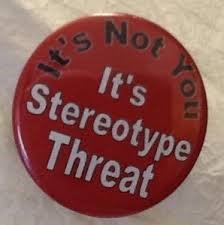 Last week I wrote about two barriers multicultural women face in obtaining sponsors: lack of access to powerful networks and lack of social capital.
Last week I wrote about two barriers multicultural women face in obtaining sponsors: lack of access to powerful networks and lack of social capital.
This week I will explore stereotype threats.
The Inclusion Solution offered a Point of View on stereotype threats in a previous post. A stereotype threat is “a situational predicament felt in situations where one can be judged by, treated in terms of, or self-fulfill negative stereotypes about one’s group”.
In the case of multicultural women, there are a number of stereotypes that turn into stereotype threats and can impact not only other’s perceptions but self-perceptions as well. Self-perception is a powerful predictor of performance. Some of the common stereotypes about multicultural women are offered in the table below.
|
Stereotypes About Multicultural Women
|
|
African American Women
|
Asian American Women
|
Latina Women
|
Such Stereotypes can lead to stereotype threats and negatively impact performance.
Researchers, such as Claude Steele who wrote the Book Whistling Vivaldi And Other Clues to How Stereotypes Affect Us, recount numerous experiments where African Americans, Asians and Latinos perform less well when stereotype threats are present. Anxiety about being judged stereotypically as a woman, Black, even a white male—particularly when that stereotype is negative—can seriously hinder performance.
For example, if a multicultural woman is given a stretch assignment, say in a leadership role, where there are few like her who have even been in such a position, there is a high likelihood that stereotype threats will unconsciously work to her disadvantage. She may unconsciously hold the belief that she is not qualified for the role, which leads to greater anxiety and lower performance. For her manager, it may lead to confirmation bias—that is support for what he/she believes (either consciously or unconsciously) about the multicultural woman’s particular identity group.
Self-Affirmations to Combat Stereotype Threats
What can be done about stereotype threats? There is a growing body of research that points to something as simple as self-affirmations. The negative effects on performance produced by stereotype threats are a threat to one’s self integrity, according to researchers. Self- affirmations are thought to mitigate the negative effects of the stereotype threat, freeing cognitive sources such as memory capability to improve and enhance performance. In other words, if you are not thinking about the stereotype threat, but rather something positive about yourself, it frees your mind to perform better.
In the case of the multicultural woman given the stretch assignment, if she can think of other women in her identity group who have performed well in leadership roles (not even necessarily in her organization), and see herself in that light, there is a higher likelihood that she will overcome the stereotype threat. In addition, by affirming her capabilities in other areas where she knows that she is highly competent, will lessen the stereotype threat for the stretch assignment.
Multicultural women can become more sponsorable if they are more aware of the role that stereotype threats play and consciously address them by:
- Understanding the concept of stereotype threats
- Increasing self-awareness of the personal impact of stereotype threats
- Identifying role models who negate the stereotypes
- Creating self-affirmations that can consciously replace the unconscious stereotype threats
While these steps sound easy, they are actually extremely difficult because the idea of stereotype threats is very complex and they may be hidden deeply in our subconscious.


















